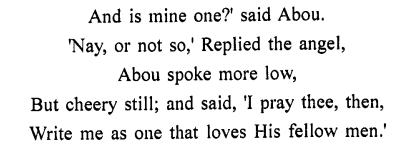Treasure Trove A Collection of ICSE Poems Workbook Answers Chapter 8 The Patriot – ICSE Class 10, 9 English
EnglishMathsPhysicsChemistryBiology
Comprehension Passages
Stanza 1

Read the above lines and answer the questions that follow.
Question 1.
Explain with reference to the context.
Answer:
This is stanza has been taken from the poem Patriot into Traitor” written by Robert Browning.This poem is a criticism of politics and people’s opinion. When a leader comes into power, people call him a patriot. When he is dethroned, the same leader is considered a traitor. This is the tragedy of modern politics. The leader in this poem fell a victim to the same state of affairs. When he came into power, people showered flowers at him as a patriot. But after a year, they declared him a traitor, when he was no more in power. They took him to the gallows. But Browning has ended his poem not on a tragic, rather on a next world optimistic note.
In these lines the poet says through the mouth of a political leader, when for the first time, only one year ago, on that very day, he came to power, the people gave him a very warm welcome. There were roses mixed with myrtle flowers which people spread on his way through and through. The house-tops were crowded with people and they were moving and swinging like mad people. Also they were so happy as if they were mad. The minarets and domes of churches were shining with light. These churches were decorated with colourful flags. All this was on that very day when the politician came into power and it took place only one year ago.
Question 2.
By which flower was the patriot welcomed?
Answer:
He was welcomed with roses and myrtles.
Question 3.
When was the patriot welcomed?
Answer:
The patriot was welcomed a year ago.
Question 4.
“The house-tops seemed to heave and sway”. Explain
Answer:
The heaving and swaying motion creates an image of overcrowding, emblematic of our speaker’s importance. It suggests that he is a celebrated figure – one that everyone wants to see.
Stanza 2
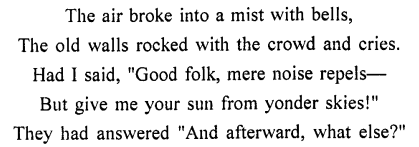
Read the above lines and answer the questions that follow.
Question 1.
Explain with reference to the context.
Answer:
This is stanza has been taken from the poem Patriot into Traitor” written by Robert Browning.This poem is a criticism of politics and people’s opinion. When a leader comes into power, people call him a patriot. When he is dethroned,-the same leader is considered a traitor. This is the tragedy of modern politics. The leader in this poem fell a victim to the same state of affairs. When he came into power, people showered flowers at him as a patriot. But after a year, they declared him a traitor, when he was no more in power. They took him to the gallows. But Browning has ended his poem not on a tragic, rather on a next world optimistic note.
When the people were given him a warm welcome they rang bells and raised slogans. These different voices mingled with one another and produced a sort of music.The air became misty and heavy because of the noisy slogans and the ringing bells. The slogans of the crowd were so heavy and loud that the adjacent walls of the road-side houses trembled with various cries and noise of the crowd. These people were welcoming him so happily that if he had told them that mere noise and slogans did not please him. And that they should give him the sun, that is there in the sky far away from them , they would have replied, that was executed (done and what else they could do for him ‘the leader’.
Question 2.
What did the patriot want form the “Good folks”?
Answer:
The patriot said “give me your sun from yonder skies”.
Question 3.
Explain“And afterward, what else?”
Answer:
“And afterward, what else?” adds to the image of endless love that the speaker received from the public. Browning includes the voice of the crowd here to indicate that the speaker is not exaggerating, and it makes his fall from glory even more tragic.
Stanza 3
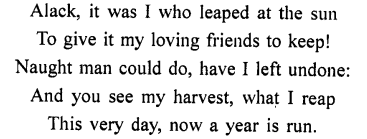
Read the above lines and answer the questions that follow.
Question 1.
Explain with reference to the context.
Answer:
This is stanza has been taken from the poem Patriot into Traitor” written by Robert Browning.This poem is a criticism of politics and people’s opinion. When a leader comes into power, people call him a patriot. When he is dethroned, the same leader is considered a traitor. This is the tragedy of modem politics. The leader in this poem fell a victim to the same state of affairs. When he came into power, people showered flowers at him as a patriot. But after a year, they declared him a traitor, when he was no more in power. They took him to the gallows. But Browning has ended his poem not on a tragic, rather on a next world optimistic note.
In these lines the leader regretfully says that the people did not help him, instead, it was he who leaped at the sun and made impossible, possible for them. He brought the sun down and handed it over to his dear friends (country men). He made, .them realize that every impossible could be made possible for sincere friends. As such he made every effort and did not leave any thing undone for them. Had he left anything undone, nobody else would have done that for them. But he further says with great sorrow that today when only one year has lapsed and that he is no more in chair, his reward can be seen. It can also be seen what he is reaping as a reward of his deeds. He has been branded as a traitor by the people of his nation.
Question 2.
Comment on the tone of the Patriot in this stanza.
Answer:
Throughout the whole of stanza, the patriot is reflecting and thinking . He states, ‘Nought man could do, have I left undone’. He feels he did everything he could have possibly done. We gather he also has power, ‘what I reap’ illustrating how he has collected his rewards from the work he has done.
Question 3.
What does the word ‘harvest ‘ connote here?
Answer:
Harvest, here means reward.
Stanza 4
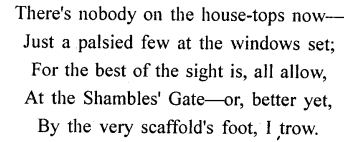
Read the above lines and answer the questions that follow.
Question 1.
Explain with reference to the context.
Answer:
This is stanza has been taken from the poem Patriot into Traitor” written by Robert Browning.This poem is a criticism of politics and people’s opinion. When a leader comes into power, people call him a patriot. When he is dethroned, the same leader is considered a traitor. This is the tragedy of modem politics. The leader in this poem fell a victim to the same state of affairs. When he came into power, people showered flowers at him as a patriot. But after a year, they declared him a traitor, when he was no more in power. They took him to the gallows. But Browning has ended his poem not on a tragic, rather on a next world optimistic note.
In these lines the poet mourns that nobody can be seen on the housetops to welcome him now. It is quite opposite to the scene when he was received by them. Now there are only a few people, who are rather paralyzed and are standing at the windows. Now they are watching a different sight. This sight is a sort of ridicule and everybody agrees to it.
Obviously, the sight is horrible because the leader is now being taken to the slaughter house, or it can be better said, the leader thinks, that he is being taken to the gallows to be hanged there. It is all the reward of his good deeds. His deeds have been converted into wicked deeds and people are now punishing him for his supposed misdeeds.
Question 2.
What is ‘shamble’?
Answer:
Shamble is a slaughter house.
Question 3.
What is ‘scaffold’?
Answer:
‘Scaffold’ is the place where the criminals are hanged.
Question 4.
Why does Browning say that the palsied watched the execution?
Answer:
Browning described the people watching the execution as ‘palsied’. Only the old and riddled with disease could be bothered enough to watch the hanging. This contrasts with the importance of the man: a man of power would have many watch his death. It’s all gone wrong as nobody is on the roof tops.
Stanza 5
Read the above lines and answer the questions that follow.
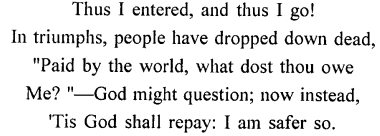
Question 1.
Explain with reference to the context.
Answer:
This is stanza has been taken from the poem Patriot into Traitor” written by Robert Browning.This poem is a criticism of politics and people’s opinion. When a leader comes into power, people call him a patriot. When he is dethroned, the same leader is considered a traitor. This is the tragedy of modern politics. The leader in this poem fell a victim to the same state of affairs. When he came into power, people showered flowers at him as a patriot. But after a year, they declared him a traitor, when he was no more in power. They took him to the gallows. But Browning has ended his poem not on a tragic, rather on a next world optimistic note.
In these lines the poet also mopes over his sad condition. He says that the people are carrying him to the gallows in the rain. They unnecessarily, have tied his hands behind his back with a tight rope. When they are taking him to the slaughter-house, the rope cuts his both hands at wrists. The culprit (the leader) feels that his fore-head is bleeding. This is because everybody in his right sense is throwing stones at him. Everybody feels that he has done nothing for his countrymen. Every person has turned against him and the achievements of his past one year have been changed to misdeeds. This means they have forgotten his service to them and they are now punishing him for his good work for them.
Question 2.
Which line is a contrast to the welcome he had received.
Answer:
The lines are:
For they fling, whoever has a mind,
Stones at me for my year’s misdeeds.
In spite of this self-sacrifice, the good deeds are seem to be oft been forgotten.
Question 3.
What does the rain imagery signify?
Answer:
It is a pathetic fallacy and helps to add to the depressed mood, and could be argued to be emblematic of the speaker’s inner-cries and sadness. As well as making the patriot wet it also reduces his dignity. The rain can also be seen to symbolise how the patriot is innocent as he is washed clean. As well as this, rain in general represents corruption creating a negative tense mood. This describes the public who are clearly corrupt for hanging somebody who has doing nothing wrong.
Stanza 6
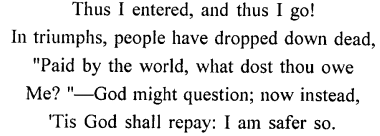
Read the above lines and answer the questions that follow.
Question 1.
Explain with reference to the context.
Answer:
This is stanza has been taken from the poem Patriot into Traitor” written by Robert Browning.This poem is a criticism of politics and people’s opinion. When a leader comes into power, people call him a patriot. When he is dethroned, the same leader is considered a traitor. This is the tragedy of modem politics. The leader in this poem fell a victim to the same state of affairs. When he came into power, people showered flowers at him as a patriot. But after a year, they declared him a traitor,, when he was no more in power.
They took him to the gallows. But Browning has ended his poem not on a tragic, rather on a next world optimistic note.
In the given lines the poet, through the mouth of the deposed leader says that he was brought honorably to the chair and with great pomp and show but now he is being taken very insultingly to the gallows. He says sometimes great heroes fall from their climax and die. Such has not happened to him. Had he died in the peak of his power, he would have been happy. Further the leader ridiculously says that heroes can not expect reward from God in the next world because they get their reward in this world. In his case people have not done him justice. They have killed him. He says after death he will go to his Lord Creator where God Might question him about his deeds he had done for the people. He would reply that he had done his best for them but they rewarded him with shame. Now he will ask God for a reward because God is just and He would give him the best reward – in the other world for his service to his people. He would be safe with God in the work here after.
Question 2.
Give an example of Antithesis from the poem ‘The Patriot: An Old Story.’
Answer:
“Thus I entered, and thus 1 go!” is an example of antithesis.
Question 3.
How did the leader come and go?
Answer:
The leader came like a patriot and went like a traitor.
Question 4.
What type of poetic piece ‘The Patriot: An Old Story’ is?
Answer:
‘The Patriot: An Old Story’ is a dramatic monologue.
Question 5.
Can one see the faith of humans in God in the poem?
Answer:
The poem is about human predicament.Good deeds are not often rewarded or appreciated in this world. People with religious belief find solace in the hope that they will be rewarded with paradise. The poet has effectively used the metaphor of calcification Jesus Christ and the poem reminds the life of Gandhiji, Lincon etc.
Project
Question 1.
Can the poem The Patriot be considered a dramatic monologue? Justify.
Answer:
Dramatic monologue refers to a type of poetry and Robert Browning is master in it. It is a “mono-drama in verse”. Like many other dramatic monologues of Browning “Patriot into Traitor” is also a fine example of this genre because it has a single speaker, a silent audience and dramatic situation.
Firstly, the poem has a solitary speaker who is patently not the poet. He is an erstwhile worshipful leader who is receiving unearned punishment. In this critical situation, he is freely giving vent to his feelings to reveal the inner working of his mind. He is, in fact, “a soul in action”.
Secondly, the poem has a silent audience. There is no dialogue between the speaker and the audience. This audience consists of people who adore or abhor someone unexpectedly. This implied presence of an auditor distinguishes this dramatic monologue from a soliloquy in which the speaker is alone.
Thirdly, the poem presents a tragic dramatic situation. It invokes in us feelings of pity, fear and relief called catharsis. The leader’s downfall excites feelings of pity in us. We fear because we recognize similar possibilities in us. However, the leader’s belief, “Tis God shall repay: I am safer so” gives us relief.
Question 2.
Is there any relevance of this poem to the present scenario?
Answer:
Yes, the poem is relevant even today. Patriot into Traitor’ is a realistic depiction of the dilemma of our contemporary political scenario of the Third World countries where mass- illiteracy, political instability, economic deprivation, institutional frailty, and democratic immaturity create the vacuum and in come the military coups, many times with the spilling of the blood cheaper than water. It is how these countries turn into blasted heath of Shakespeare’s Macbeth and the witches enjoy the scene there for fair is foul and foul is fair there. The heroes of yester year turn into villains of today.
The first scene presented through this dramatic monologue is that of joy and jollity. The leader is being welcomed by all and his whole way is decked with rose-petals and myrtles. People have gathered there to greet him and roofs and walls rock and seem to sag underneath their load. Their noise fills the air with jingling heaviness. The minarets of churches seem to be ablaze as the flags of all the incendiary colours flutter there. But it is the scene of one year back. If he had asked them to turn the impossible into possible, they would have done so but he himself jumped at the sun for them and whatever he is reaping today is of this tragic flaw
He is handcuffed and people are stoning him almost to death. He bleeds and is being taken to the gallows through the deserted streets. People gather there to enjoy the scene of his being hanged. So it is God who is to reward him in the life-hereafter. We witness these scenes everyday in the Third World countries.
Question 3.
What is the rhyme of ‘The Patriot: An Old Story’?
Answer:
The rhyme of the poem ‘The Patriot: An Old Story’ is ababa.
Question 4.
Explain the difference between welcome scene and departure scene from the poem “The Patriot” by Robert Browning.
Answer:
The welcome scene and the departure scene, as you call them, are sort of mirror images of one another. They show how the fortunes of the speaker have been turned completely around in the year that elapsed between the two scenes.
In the welcome scene, the speaker is a hero. The people are all praising him. They would give him anything he wants as he is paraded along. In the departure scene, he is being paraded again. But this time his hands are tied and he is clearly about to be executed. This time, people are throwing rocks at him.Over the course of the year, he went from a hero to a villain, presumably because he did not achieve the goal he set out to achieve.
Question 5.
Can the poem be taken as interpretation of human fickleness?
Answer:
This poem is very interesting. Its ambiguity allows a large range of interpretations to the meaning. It may be that Browning is portraying the fickleness of human nature as the patriots deeds are forgotten as no bodys on the rooftops now,versus the faith to God not leaving in bad times as humans do. However, it may also be about the consolation humans find in feeling accepted and glorified, as is suggested by the use of dramatic monologue and the symbolism of the patriot and Jesus, which hints at a sense of selfabsorbance and the bitterness of being rejected from society.
Question 6.
How has Browning used allusion in the poem? Explain.
Answer:
Browning uses the story of Icarus to describe the ambition of the man in stanza three. This creates a moral of the story not to be too ambitious, like Icarus with flying. Icarus attempted to fly by sticking feathers to his arm with wax. However, the closer he flew to the sun, the more the wax melted until he fell from the sky. Browning uses this story to introduce an ideology to not be too ambitious which unfortunately the patriot was. The whole of stanza three reflects on what he has done. The man feels he carried out everything he possibly could have which makes his life even more of a travesty, ‘Nought man could do, have I left undone’. The man feels he deserves a reward, ‘I reap’, sharing with the reader that he has power. From this, Browning described the man as someone powerful and for the good of mankind, juxtaposing it to what the public thought, creating a sense of unfairness
Extra Questions
Question 1.
Comment on the imagery used in the poem.
Answer:
The poet has used visual imagery, auditory , tactile and kinaesthetic imagery. Visual imagery is there in the following lines :‘lt was roses, roses, all the way,’ ‘the church-spires flames, such flags they had,’ ‘Just a palsied few at the windows set;
Auditory images abound in the lines: ‘The air broke into a mist with bells, /The old walls rocked with the crowd and cries.’
Tactile images are found in: ‘A rope cuts both my writs behind;/And think, by the feel, my forehead bleeds,’
Kinesthetic imagery in “The house-tops seemed to heave and sway”/ Alack, it was I who leaped at the sun
To give it my loving friends to keep!
Question 2.
Who is reminded of his past? Why?
Answer:
The patriot is reminded of his past because then he was welcomed with roses and myrtle and now the same people are humiliating him and throwing stones at him and are going to hang him.
Question 3.
What bells are being referred to here? Why are they rung?
Answer:
The church bells are being referred to here. They are being rung to welcome the patriot and honour him.
Question 4.
What tells you that the speaker was swayed by the enthusiasm of his admirers? What proves him wrong?
Answer:
The lines where he says
‘Had I said, “Good fold, mere noise repels—
But give me your sun from yonder skies!”
They had answered, “And afterward, what else?’ show that he had believed in their enthusiasm in the past but he feels sad at what they had done to him in the present, at the way they had humiliated him.
Question 5.
In what mood is the speaker now? Where is he?
Answer:
The speaker is in a sad and despondent mood. He is depressed at the way he has been humiliated at the stones people have thrown at him. He is at the scaffold in the street where he is to be hanged.
Question 6.
What tells you that the patriot was overambitious?
Answer:
The line which tell us that he was overambitious is: Alack, it was I who leaped at the sun To give it my loving friends to keep! But the people had rewarded him with humiliating him for his past deeds.
Question 7.
Explain, ‘Just a palsied few at the windows set;’
Answer:
Instead of the cheering crowds who had welcomed him a year ago now there are only a few diseased and old people gathered to see him being hanged. This is the humiliation which he is faced with as no longer is he a celebrity who people will throng to see.
Question 8.
What do you think of the mentality of the crowd?
Answer:
The crowd is fickle. Only a year ago had they given him a welcome fit for a hero and now they were humiliating and degrading him by throwing stones.
Question 9.
Explain:
Thus I entered, and thus I go!
In triumphs, people have dropped down dead.
Answer:
In these lines the speaker says that says that he was brought honourably to the chair and with great pomp and show but now he is being taken very insultingly to the gallows. He says sometimes great heroes fall from their climax and die. Such has not happened to him. Had he died in the peak of his power, he would have been happy.
Question 10.
What thought makes him feel safer?
Answer:
The speaker says:
“Paid by the world, what dost thou owe
Me? “—God might question; now instead,
‘Tis God shall repay: I am safer so.
He says sometimes great heroes fall from their climax and die. Such has not happened to him. Had he died in the peak of his power, he would have been happy. Further the speaker says that heroes can not expect reward from God in the next world because they get their reward in this world. In his case people hgve not done him justice. They have killed him. He says after death he will go to his Lord Creator where God Might question him about his deeds he had done for the people. He would reply that he had done his best for them but they rewarded him with shame. Now he will ask God for a reward because God is just and He would give him the best reward in the other world for his service to his people. He would be safe with God in the world here after.
For More Resources


